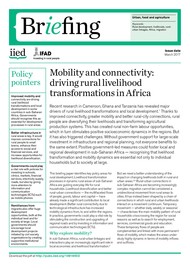Urbanisation, changing tastes and rural transformation in West Africa

Between 1950 and 2000, the total population of West Africa increased fourfold, with almost one third now living in urban centres. Alongside growing urbanisation, many countries in the region increasingly rely on food imports for certain staples. These imports mix with local and regional foods to create a complex food system in terms of how and where food is purchased and consumed. Indeed, imported food may actually be integrated within traditional meals. At a workshop in Dakar, Senegal, participants reviewed current knowledge on these trends and how they affect low-income groups. They agreed that informal actors such as small-scale food processors and producers must develop greater capacity to meet evolving consumer demands, as well as health and safety standards. Decision makers must recognise informal actors as key players in food systems; for their part, informal actors must develop skills to engage more effectively in policy dialogue.
Cite this publication
Available at https://www.iied.org/17334iied






